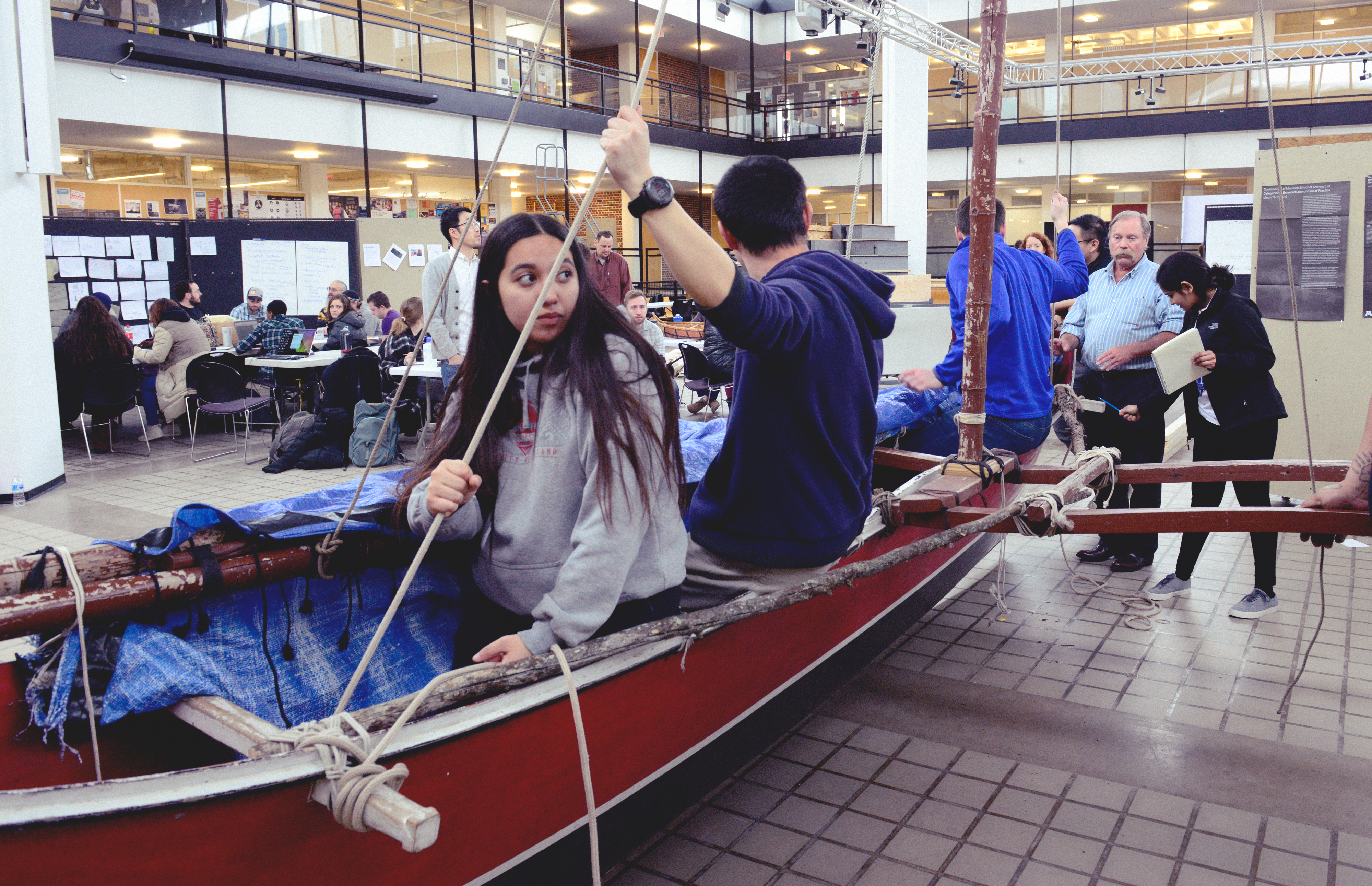Architecture as Catalyst is an annual week-long event, bringing new ideas, conversations, and expertise to the School of Architecture by inviting guests from around the world to run experimental workshops with graduate students and give public lectures on their work.

This year’s Catalyst is intended to create discussion around the practice of “making” as it relates to design and architecture. Building on last year’s event, Catalyst 2019 brings back the communities from last year to “make” something together. These projects include:
Wachusko weesti
The wachusko weesti project is a community-led collaboration between an interdisciplinary research team (including Indigenous and non-Indigenous academics, professionals and students) and First Nation leadership and community members. The project addresses two critical issues that affect First Nation communities: inadequate access to safe water, and a shortage of adequate housing. It is a mobile, off-grid and sustainable washroom and kitchen unit, identified as a priority by OCN community members as a critical piece of infrastructure for land defense and remote house building. Participants will explore material and assembly concepts attached to Indigenous material cultures, deployable “pop-up” architectures, and will test spatial packing logics and community-oriented construction systems to make a “micro,” ATV-pullable, Wachusko weesti basecamp unit.
Solar Oasis
Following the September 2017 landfall of Hurricane Maria, millions of Americans awoke to an island devastated by wind and water—an altered landscape of fallen trees, toppled transmission lines, and broken shelters. In the months that followed, most were left stranded without power, communication, or adequate support. Today, many communities are still suffering from the effects of the neglected infrastructural systems that Maria exposed. In response to this plight, a group of researchers at the University of Puerto Rico organized a team to develop and construct a solar-powered charging station to be used in disconnected communities. The original OASIS de Luz was installed in Jayuya, Puerto Rico in November 2017 and another was built in Borinquen in Caguas. The Catalyst 2019 project builds on these ideas and extends the project’s community of practice in an effort to create a system of resilient pods that can be programmed and deployed across the archipelago of Puerto Rico (and beyond) to provide critical infrastructure to those in need.
Boat Cultures
This workshop takes a deeper dive into the material culture of two indigenous communities from Western Minnesota through examination and engagement with boat making in the Micronesian context (outrigger canoes) and the Dakota context (birchbark canoes and/or dugout canoes). Participants will engage with materials and making not as a process of forcing ideas on to matter but as an experience of joining the forces of matter in improvisation. This workshop joins the work of the interdisciplinary Grand Challenge project, Back to Indigenous Futures: Cultural Revitalization and Sustainability through Trans-Indigenous Partnerships, Participatory Design, and Embodied Computing, and builds on the 2018 Catalyst exploration with the Micronesian communities in envisioning their emerging needs around building and landscapes. Participants will collaborate and learn with professors and students from American Indian Studies and Computer Science and Engineering and technology experts. This final result will be a traveling exhibit of boat cultures from the Catalyst work.
Envision
Envision Community is a dignified and diverse community from across the housing spectrum, providing much-needed housing for people experiencing homelessness. Learning from this model will teach valuable information about the role of health care in housing. Traditional affordable housing projects start with the building design and work backward to raise the money. Catalyst 2019 will flip that model by starting with the dollars that are sustainably available and then designed at that price point. The Envision project applies the human-centered design process at every step to ensure the housing and community are co-created with the people who are most impacted. Working with an extended community of practice that includes members of the Street Voices of Change, doctors, architects, affordable housing developers, policymakers, and academics participants will begin constructing the initial prototype for the Envision Community, and through this making finalize several key design and assembly aspects of the project.
Check out the full list of Catalyst 2019 events in the schedule.
Monday, March 11th
- 8:00 – 9:00: Catalyst Intro
- 9:00 –11:00 Micro Workshop Session #1 (Videography + Visual Communications)
- 11:00 – 12:00: Panel Discussion – Making as Way of Thinking (Virajita Singh, Alex Heid, Kevon Groenke, Vince Diaz, Dan Keefe)
- 12:30 – 1:00: Lunch Break
- 1:00 – 3:00: Micro Workshop Session #2 (Videography + Journalism)
- 3:15-5:15: Micro Workshop Session #3 (Visual Communications and Journalism)
Tuesday, March 12th
- 8:00 – 11:00: Project Work Session
- 11:00 – 12:30: Panel Discussion – Community Making (William Walsh, Street Voices of Change, Alex Wilson, Deborah Kelley)
- 12:30 – 1:00: Lunch Break
- 1:00 – 5:00: Work Session
Wednesday, March 13th
- 8:00 – 11:00: Project Work Session
- 11:00 – 12:30: Panel Discussion – Making Differently (Megan Voorhees, Carla Gutler, Chris Cornelius, Margaret Werry, Will Heegaard)
- 12:30 – 1:00: Lunch Break
- 1:00 – 5:00: Work Session
Thursday, March 14th
- 8:00 – 10:30: Plenary Session (global convergence + making)
- 11:00 – 12:30: Panel Discussion – Extended Communities of Practice (Richard Merrit, Adheld Mestad, Marcel J Castro Sitiriche)
- 12:30 – 1:00: Lunch Break
- 1:00 – 5:00: Work Session
Friday, March 15th
- 8:00 – 12:00: Project Curation
- 12:30 – 1:00: Lunch Break
- 1:00 – 4:00: Project Curation
- 4:00 – 6:30: Open House
The One House, Many Nations campaign, founded by indigenous activist group Idle No More, works to address the lack of quality housing found in First Nations and other indigenous communities.
Since 2005, Art Shanty Projects has transformed frozen lakes into vibrant, artist-driven communities.
Led by Assistant Professor Jacob Mans (Architecture), Assistant Professor Gabe Chan (Humphrey School of Public Affairs), and Megan Voorhees (Institute on the Environment) a team of 11 University of Minnesota students spent part of their winter break studying energy transitions in Puerto Rico.





